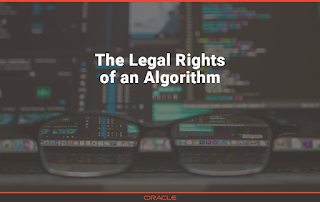The Legal Rights of an Algorithm
At first glance, you might think how it’s possible for something that doesn’t have a mind, body, or soul to have any legal entitlement. After all, algorithms don’t have physical attributes, and their existence can’t be easily tracked unless you’re a tech specialist responsible for creating them.
However, while algorithms don’t have any physical attributes, they have become smarter over time, mimicking human behaviors and traits to produce actionable results. Initially, algorithms started as simple data sets combined in several valuable ways to create patterns. They generate suggestions and solutions that help guide you, whether you’re on social media or search engines, while also providing insights within several fields, including the legal, medical, and marketing fields. Algorithms also consistently correct their mistakes without requiring human intervention.
Believe it or not, algorithms have legal rights too. While many users are skeptical about algorithms because of security and privacy concerns, they are vital to securing data. And, over time, algorithms, and artificial intelligence as a whole, keep gaining legal traction.
Can Algorithms Have Legal Freedoms?
As corporations have the same rights as individuals in the United States and are afforded the same protections via the American constitution, the argument for algorithms getting the same legal privileges has more merit. Corporations, like algorithms, are mindless and bodiless entities, yet, they are treated like humans given they are on equal legal footing as people.
The concept of algorithms having legal rights similar to corporations is plausible. If algorithms and AI systems, in general, could control a limited liability corporation (LLC), for example, they could sue, own property, have freedom of speech, and be afforded other legal protections. Algorithms have also been given the ability to make biased decisions, though that comes with its own set of qualms. Automated decision-making systems such as predictive policing don’t just help apply procedural rules but have also become primary public policy decision-makers.
How Do You Regulate Algorithms?
https://images.unsplash.com/photo-1547190027-9156686aa2f0?ixlib=rb-1.2.1&ixid=MnwxMjA3fDB8MHxwaG90by1wYWdlfHx8fGVufDB8fHx8&auto=format&fit=crop&w=1170&q=80
Algorithms are hard to understand, even for some experts
Europe has jumped to the forefront regarding the regulation of algorithms, with the European Commission creating two legislative initiatives. The Digital Markets Act (DMA) and the Digital Services Act (DSA) were made to ensure that recommendation algorithms are as transparent and safe as possible while triggering innovation and facilitating fair competition. These acts are to oversee the online platforms that play systemic, extensive roles in linking businesses and individual users. Thanks to these legislations, regulatory authorities worldwide must decide how to achieve new policy goals and ensure that the gatekeepers of these algorithms are acting with good faith.
The reason algorithms must be consistently regulated is the intentions of the people who create and utilize them. It would be misguided to think that the social platforms tasked with employing these algorithms are indifferent to how they are used and the consequences of their usage. The algorithms are designed to execute specific purposes, working specifically for the short term. However, misinformation can go unchecked because traits like truth and quality are absent from some algorithms, like social media ‘likes,’ for example.
Creating Legislation to Prevent Algorithm Misuse
https://images.pexels.com/photos/4164418/pexels-photo-4164418.jpeg?auto=compress&cs=tinysrgb&dpr=2&h=650&w=940
Algorithms are increasingly being legislated to prevent suspicious activity
There has been a more significant push to legislate algorithms to prevent unscrupulous uses or unintended misuse of algorithms, prompting increased efforts to create strong standards. Institutes like the U.S. National Institute of Standards and Technology (NIST) have introduced workshops and discussions with public and private sectors regarding federal standard development. The conversation centers around creating standards that facilitate more robust AI-based systems and ensure the transparent, safe use of algorithms.
As algorithms are gradually replicating and taking over decision-making processes, some of them make decisions that affect people and their legal rights. These algorithms are ubiquitous, guiding commercial transactions, evaluating applications, and controlling aspects of different sectors like surgeries in the medical field. However, despite the benefits that algorithms provide society with their decision-making capabilities, they exhibit similar biases to their human counterparts, with specific decisions violating the constitutional rights of humans. As a result, algorithms can collude to make controversial decisions like price-fixing or other illegal practices that suit the purpose of the people charged with creating and executing the algorithms.
There are also black-box algorithms that are very precise with predicting things. But, it’s unclear to interpret what these algorithms are suggesting, even for experts. As a result, it’s hard to know what algorithms like these are doing (legally), in part because their understanding of things at fast speeds sometimes surpasses human understanding. A greater understanding of these algorithms and their capabilities are required so that the intelligence of algorithms, combined with human understanding and empathy, can show, and they attain the legal protections necessary to act on humans’ behalf.
In the end, algorithms are gradually attaining many of the legal rights that humans are but still need their fair share of fine-tuning before they can enjoy full freedoms.





It's interesting to note that copyright, and much of intellectual property law, has danced with these questions, although not quite as pervasively. It will be an interesting journey to watch unfold.
ReplyDelete